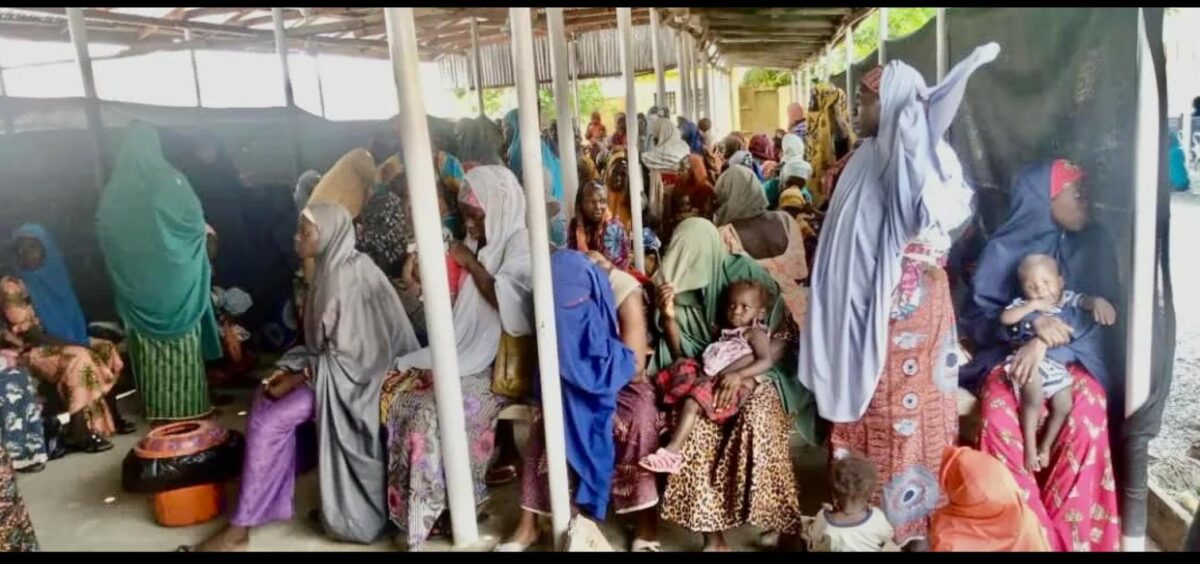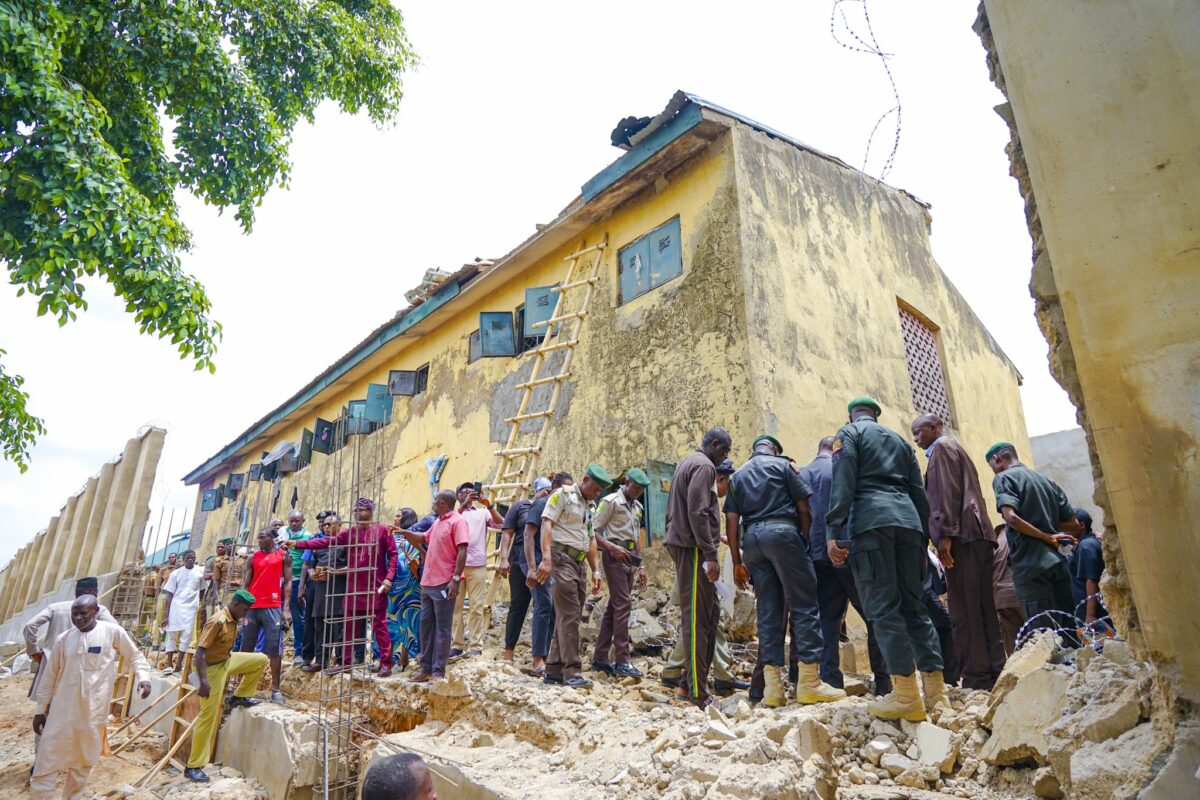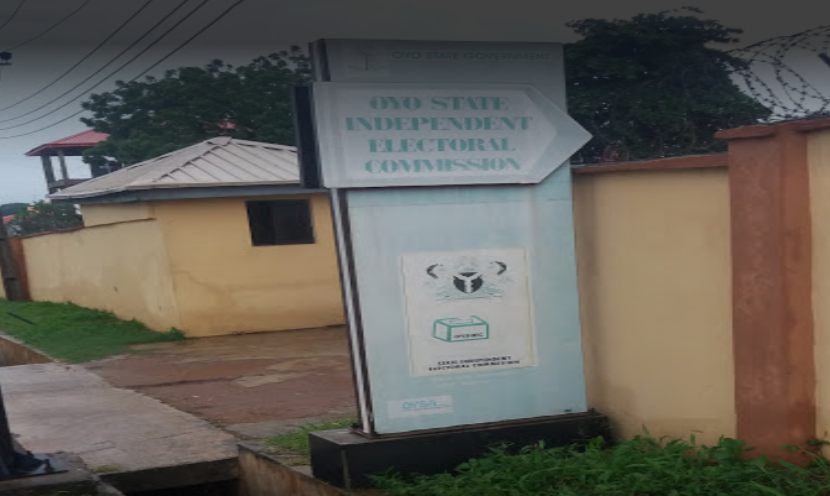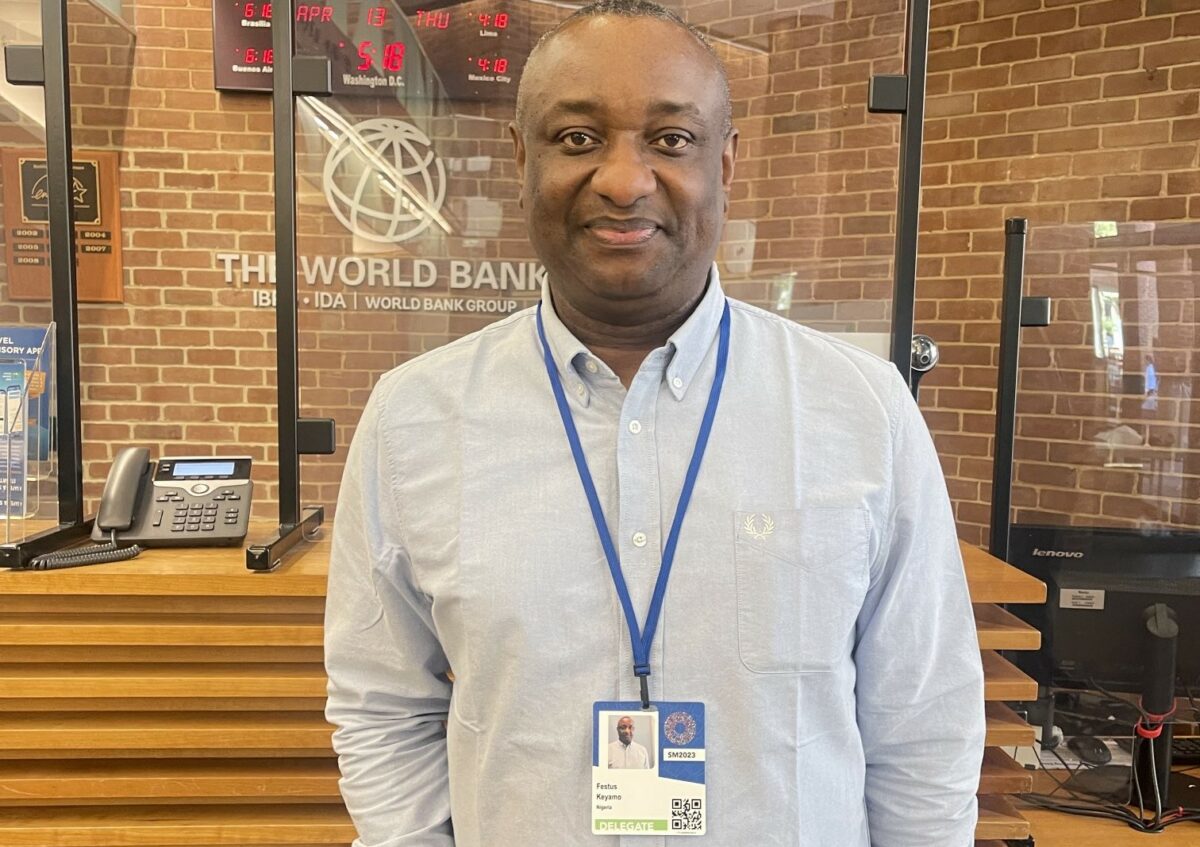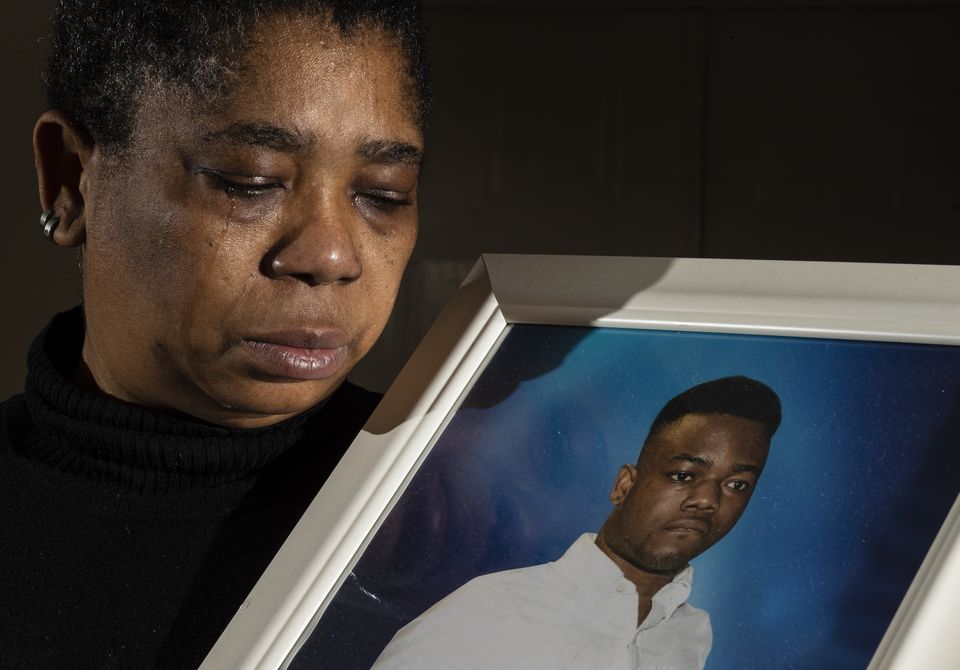In the face of a concerning surge in malnutrition-related deaths in Kano State, Mohammed Taoheed looks into the heart-wrenching challenges confronted by mothers grappling with this crisis. This report exposes a systemic nonchalance exhibited by the government, aggravating an already dire situation and shedding light on the urgent need for decisive action.
Hafsat Kabir’s heart ached as she remembered the night her first child succumbed to malnutrition in 2015. Tears still welled up in her eyes, even after years had passed. Now, the fear of losing another child gnawed at her soul.
Last year, weeks after the birth of her fourth child, Hafsat noticed a disturbing change. The baby was feverish and weak, unable to breastfeed due to a lingering illness Hafsat herself battled. Poverty gripped her family tightly, preventing her from seeking immediate medical attention. Weeks turned into months, and the weight of fear grew heavier with each passing day. The usual pap and goat milk offered little sustenance, and the baby remained frail and skeletal.
“We had no money for the hospital, and we thought we could manage the situation at home. My baby eventually died,” Hafsat said, her voice cracking with emotion.
The relentless struggle for her child’s health forced Hafsat to abandon her teaching career. Now, she dry-cleans clothes, burdened by debt and the grief of losing her child.
Hafsat’s story is not unique. In Dawakin Kudu Local Government Area (LGA), countless families face the devastating consequences of malnutrition. According to UNICEF, an estimated 2 million children in Nigeria suffer from severe acute malnutrition, with 37 percent under the age of five suffering from stunted growth. This grim reality places Nigeria as the second-most stunted nation globally, a statistic that screams for immediate action.
DATA PAINTS A BLEAK PICTURE
Approximately 1.5 million children under five in Kano State, representing over 10 percent of the national burden, suffer from stunting, a chronic condition caused by malnutrition. This staggering statistic paints a grim picture of Kano State’s children and highlights the dire need for immediate intervention.
Exacerbating this situation is the limited access to quality healthcare for rural communities, where families often struggle to afford basic necessities. Transportation to reach medical facilities in urban areas can cost upwards of N1,200 per day, an insurmountable barrier for many.
The burden of caring for malnourished children falls primarily on mothers, most of whom are unemployed. This reality forces them to incur debt or embark on arduous treks to reach healthcare centres, often without guaranteed access to necessary treatment.
A doctor at Gano PHC in Dawakin Kudu LGA, speaking anonymously, revealed that the facility lacks the resources and specialised training to effectively manage malnourished patients. Their primary role is to issue referrals, further emphasising the gaps in the healthcare system.
Dawakiji PHC, another rural facility in the same local government, echoed the same sentiment, underscoring the systemic challenges that hinder effective treatment for malnourished children in Kano State.
ONE PHC TO OVER 1,000 MALNOURISHED PATIENTS
A visit to Tarauni LGA in November revealed a grim reality. Over 1,000 mothers gathered in the wee hours, their frail and skinny babies cradled in their arms, waiting patiently at the Unguwa Uku PHC. Among them was Fatimah Musa, whose nightmare began four months after her baby’s birth.
Fatimah, like many others, initially resorted to traditional remedies to avoid the burden of medical bills. This later proved ineffective, and the baby’s condition continued to deteriorate, leaving Fatimah fearing for his life.
With no other options, Fatimah embarked on a daily commute to neighbouring Karaye LGA, a journey that drained her meagre resources. The transportation costs, combined with her husband’s lack of support, further strained her limited finances.
Fatimah’s story is one of countless struggles against malnutrition. The worsening food insecurity forced her family to rely on readily available carbohydrates, leaving them devoid of the vital protein and nutrients essential for her baby’s health.
“We took more carbohydrates,” Fatimah lamented. “I’m really suffering with this baby. I’m now afraid of having another child.”
BREASTFEEDING NOT YET UHURU IN KANO, WORSENS MALNUTRITION CRISIS
A cross-section of women from Dawakin Kudu, Tarauni and Karaye LGAs who spoke to the Daily Nigerian admitted that they are often guilty of discontinuing breastfeeding, especially when they get pregnant soon after they give birth. A study by researchers confirmed that exclusive breastfeeding stands at a low rate in Kano, thus endangering the lives of children who could not survive without it.
Registrar, Department of Family Medicine, Federal Medical Centre, Kebbi State, Dr. Mahmoud Abubakar Mukaram, argues that while mothers’ limited understanding of proper breastfeeding practices can be attributed to a lack of education, it’s ultimately the government’s responsibility to tackle this issue head-on. Inadequate breast milk intake, he emphasises, is a major risk factor for malnutrition and requires urgent government intervention to mitigate its impact on children in the northwest region.
“While cultural beliefs may restrict their diet, mothers often lack awareness about optimal breastfeeding due to limited exposure. The government must step up through radio programmes and financial support to empower mothers, discard harmful food habits, and ensure proper nutrition for their children. Neglecting these risks causes widespread malnutrition and severe health complications,” he said.
LEFT TO SUFFER, SAD FATE —— MORE TALES
Haneefah Buhari’s voice cracked as she spoke, her eyes reflecting a mixture of exhaustion and despair. “Tell me, how could a 15-month-old baby be so thin?” she questioned rhetorically, gesturing towards her child’s frail frame. Since the diagnosis of malnutrition, peace has become a distant memory, replaced by the overwhelming burden of uncertainty.
Haneefah’s voice trembled as she described the devastating impact this illness had on her family. Her tailoring business, once her primary source of income, had been abandoned as she focused on caring for her child. Her husband, a tiler, faced work challenges, leaving them in a precarious financial situation.
As if the weight of their present circumstances wasn’t enough, Haneefah revealed the news of another impending pregnancy. The thought of caring for two children, one battling malnutrition while their own future remained uncertain, filled her with a sense of helplessness.
Just like Haneefah, Fateemah Muazu’s weary eyes spoke volumes of her ordeal. The loss of one of her newborn twins in April 2023 cast a long shadow on her life, deepened by the helplessness of the situation. Her husband, an interstate driver often absent from their Dawakin Kudu home, could not offer timely assistance on that fateful day.
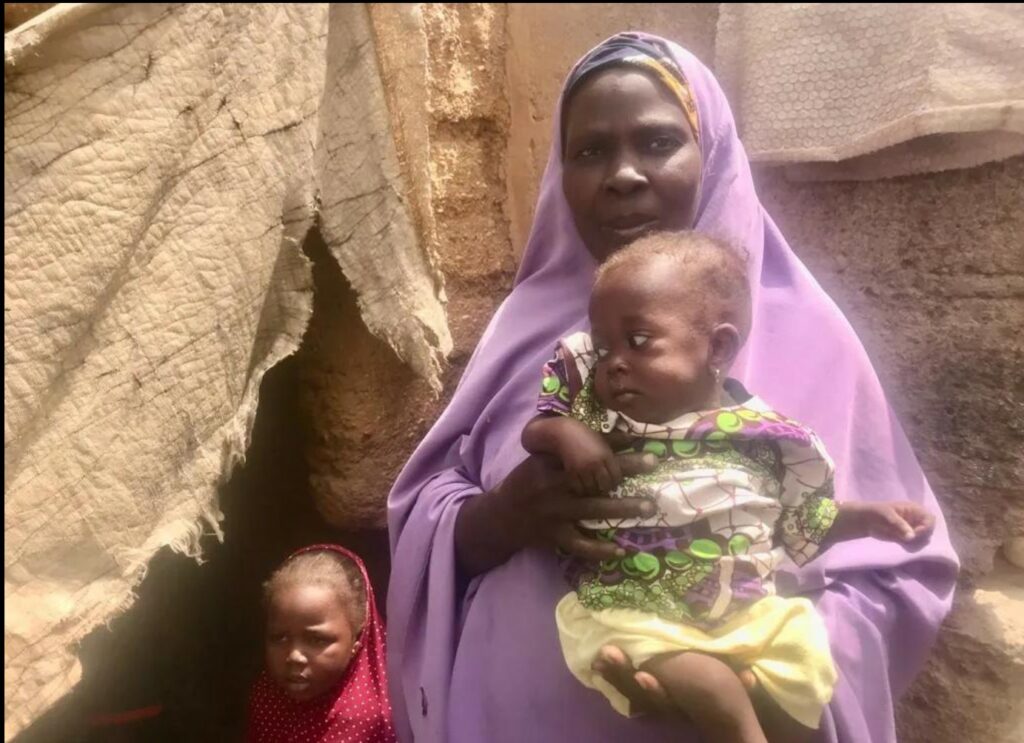
“I wasn’t breastfeeding her,” Fateemah explained with a heavy sigh. “We often consume pap, because that’s what I sell. I went to the Wudil PHC, but they couldn’t handle malnutrition there and sent me elsewhere. I lost all hope after the first child’s death. We don’t eat meat or fish because we cannot afford it. We consume pap a lot,” she added, her voice trembling.
The grief of Aisha Tijjani, a young mother in Tarauni LGA, was palpable as she recounted the heartbreaking loss of her two sons to malnutrition. The joy of a new birth was quickly overshadowed by the child’s illness. “My two boys are gone already,” she said, tears streaming down her face, “and now this one is ill too.” With a gesture towards her frail child, she whispered, “My story with malnutrition has been a tragedy.”
Summaiya Nasiru, a 29-year-old resident of Dawakin Kudu, initially didn’t notice that her child wasn’t feeding properly. It was only during a visit to the Gano PHC that the underlying medical condition was discovered. The referral to Aminu Kano Teaching Hospital for surgery brought immense financial strain, adding to her already burdened life. “Imagine, I have no job,” she cried. “[I have] a malnourished child and another child with special needs. I’m completely exhausted.”
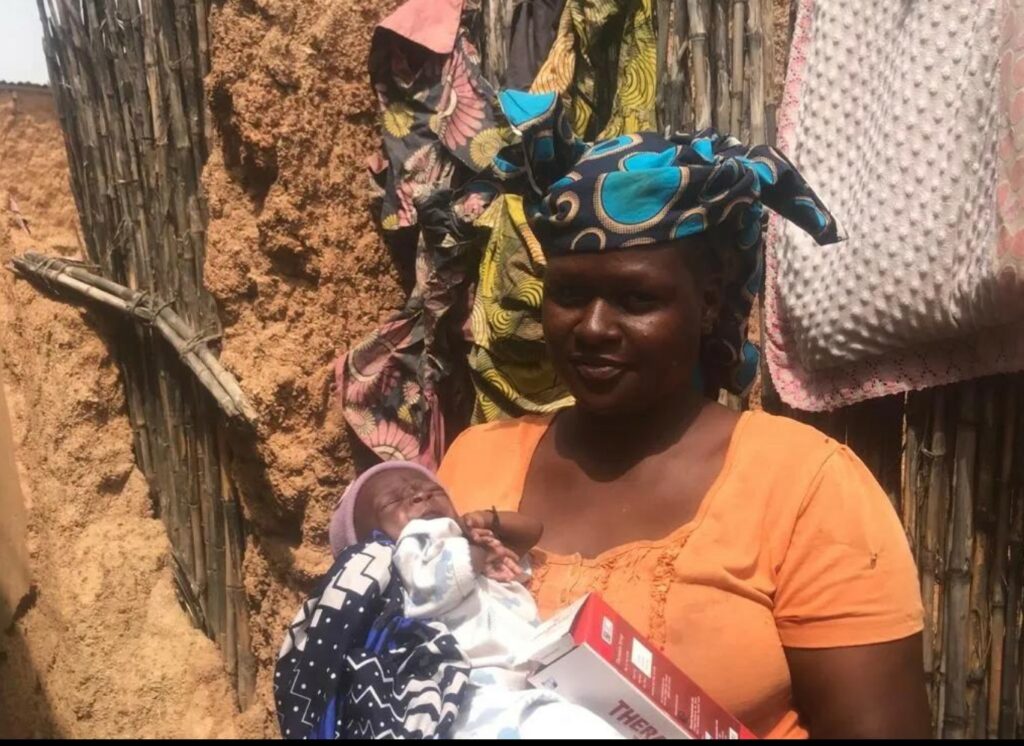
READ ALSO: SPECIAL REPORT: Oyo Schoolgirl Who Wants to be a Pharmacist Is About to Become a Bride
IS KANO STATE READY TO BATTLE THE CRISIS?
Despite the Kano State government’s 2020 commitment of N4bn to its Kano State Multisectoral Strategic Plan of Action for Food and Nutrition (KN-MSPAN), a stark contradiction remains. Malnutrition continues to plague the state, highlighting the glaring gap between policy pronouncements and tangible action.
A closer examination of the Kano State budget reveals a shocking disregard for the urgency of the situation. In 2021 and 2022, a mere total sum of N64 million was specifically allocated for child nutrition, demonstrating a blatant lack of prioritisation. Moreover, even these meagre allocations remained unfulfilled. The audited financial statements of the state paint a disturbing picture: the allocated funds for child nutrition simply never materialised.
Confronted with the stark contrast between the government’s pronouncements and findings in this report, Murtala Inuwa, Deputy Director of the Kano Primary Healthcare Management Board, offered a defensive response. He claimed that the government had allocated funds for Ready-to-Use Therapeutic Foods (RUTFs) through separate channels, portraying initiatives by partners and other stakeholders as mere supplementary support. However, his claim remains shrouded in ambiguity, as he refused to elaborate on the specifics of these alleged funds, leaving questions about transparency and accountability unanswered and doubts lingering.
Daily Nigerian’s investigation further exposed a disturbing reality: the treatment of malnourished patients in Unguwa Uku and Tudun Fulani PHCs in Tarauni LG and Ungogo LGAs, respectively, is majorly funded by Médecins Sans Frontières (MSF), an international humanitarian organisation, despite the purported allocation of ample resources as portrayed by Mr. Inuwa.
Hussain Ismail, MSF Project Coordinator, shared the organisation’s success story: “We have managed 1,353 admissions of severely malnourished cases, achieving an 88 percent cure rate and a mortality rate below 1 percent for children under five.” This stands in stark contrast to the government’s inaction, emphasising the critical role played by external actors in addressing the crisis.
Further investigations revealed the state’s heavy reliance on non-profit organisations to combat malnutrition. UNICEF’s dietary diversity project, Alive and Thrive’s MIYCN project, and the Institute of Human Virology Nigeria’s AAccelerating Nutrition Results in Nigeria (ANRiN) project are just a few examples of initiatives leading the charge against malnutrition in Kano.
However, experts who spoke with this newspaper warn that progress will remain elusive without a fundamental shift in the government’s approach. Unless the state prioritises the fight against malnutrition by allocating and releasing adequate funds, these valiant efforts by external actors will continue to be a mere band-aid solution to a gaping wound.
READ ALSO: THE POET: Hunger Made My Mother Mad
DESPITE FOI, HEALTH MINISTRY KEEPS SEALED LIPS
In violation of the Freedom of Information (FOI) Act 2011, the Kano State Ministry of Health has stonewalled a FOI request filed by the Daily Nigerian, refusing to provide details of projects, financial allocations and disbursements of funds allocated for tackling malnutrition.
Despite acknowledging receipt of the request on November 8, 2023, the health ministry has remained unresponsive, exceeding the seven-day timeframe stipulated by Section 4 FOI Act, which states that information requested should be made available within seven days after the application is received.
Initial attempts to seek clarification from the health ministry’s spokesperson, Ibrahim Abdullahi, proved futile. He deflected responsibility, claiming the information sought pertained to another department in the ministry.
“I have seen the letter and gone through it. The content of the letter shows that the information needed has nothing to do with my office. What I will advise is that you send a reminder since you’re yet to get a response,” he said.
A second reminder sent on November 28, 2023, yielded no fruitful outcome. Further attempts to reach Dr. Abubakar Labaran, the Commissioner of Health, were met with an abrupt dismissal. He ended the call without explanation and ignored subsequent calls and messages sent to his phone. These evasive tactics raise serious concerns, suggesting a deliberate effort to obscure the truth and avoid scrutiny.
READ ALSO: Garri Blended With Onion Leaves —A Sokoto IDP’s Subsistence Diet
‘NOTHING HAS BEEN DONE, GOV’T NOT SERIOUS’ —EXPERTS
Ibrahim Garba, the accountability lead at Gender and Social Inclusive in Kano, said that concerns about malnutrition seem not to bother the government.
“I count the government as not serious about the rate of malnutrition in the state. Money is just budgeted but nothing has really been done. We’re having a problem in Kano because the government is doing copy-and-paste work around the budgets. What you’ve done in the previous year will pop up again in another one but all without any implementation.
“This raises questions about the integrity of the government. They just document the money on paper, but nothing will be done. The end result is that it creates an atmosphere of doubt within the people who are supposed to benefit from their policies,” he added.
Mr. Garba’s words echoed the deep concerns surrounding Kano’s approach to malnutrition. He highlighted the state’s heavy reliance on donor agencies for funding interventions, a strategy fraught with sustainability issues. “Most of these organisations leave after their projects end,” he explained, “leaving us back at square one.”
His frustration is palpable, reflecting a growing sense of urgency. “Have we not acted too late? Where do we go from here?” He questioned.
Mr. Garba’s poignant questions lay bare the vulnerability of Kano’s current approach. The dependence on external funding creates a fragile ecosystem where progress hinges on the whims of donor agencies. This lack of self-sufficiency poses a significant threat to long-term sustainability and effective malnutrition management.
The fear of Maryam Muhammed, a public health expert in the state, about malnutrition is that it is a critical condition shrouded in several deficiencies, including anaemia, kwashiorkor and dehydration.
“To tackle malnutrition, there is a need for the Kano State government to provide adequate infrastructure, medical facilities and other materials that are prerequisites for the proper functioning of the hospitals at all levels,” she said.
“Malnutrition is very dangerous, especially when babies are not well fed. You see that the affected baby will look dry with sullen eyes. It hinders the growth of a child and the normal functioning of their brain and body is also affected, hence the need for the government to collaborate with NGOs on health education and also empower low-income households in the state.”
This story was first published on the Daily Nigerian.
Subscribe
Be the first to receive special investigative reports and features in your inbox.


